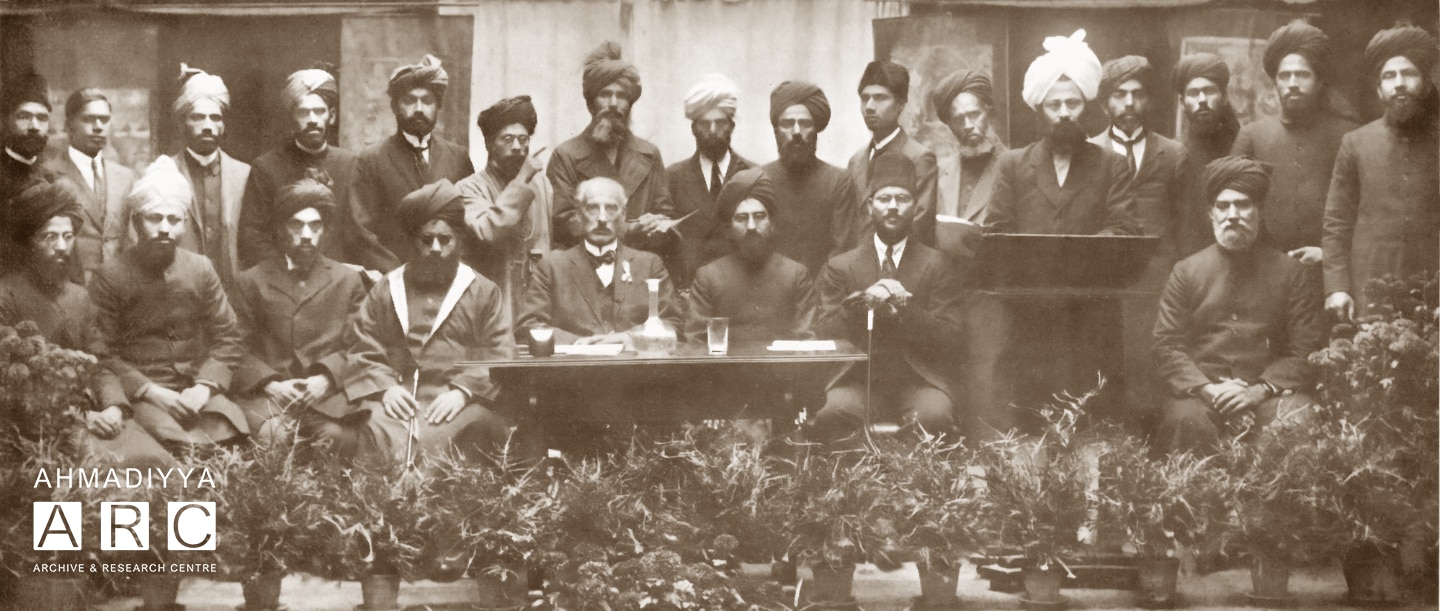Hazrat Maulana Abdur Rahim Dardra (1894-1955)

The year 1924 is a memorable year. The convening of the Conference on Living Religions in London marks an epoch-making event in the history of religions. The visit of His Holiness, Hazrat Khalifatul Masih II[ra] to London, Paris, Rome, Haifa, Damascus, Cairo, and Jerusalem reminds us, among various other important events, of the similar historical visit of Hazrat Omarra to Jerusalem.
And the laying of the foundation stone of the first London mosque establishes Islam without a doubt in the very heart of Europe. History shows that Britain experienced remarkable changes with the coming of Augustine and William the Conqueror. The son of the Promised Messiahas combines in him both. He looks august, and he has been named “Ul al-‘Azm” (William) by God.
The New Year, therefore, we hope, will bring us a step nearer towards the coming deep and mysterious spiritual change in the minds of the British people.
The year 1925 inaugurates The Review of Religions in Britain. With its dawn, The Review of Religions enters a new phase of life. From the centre of the East, it comes to the centre of the West. From the sunny seat of spirituality, it is at once translated into the dark, foggy, snowy and smoky lands of materialism.
The Review of Religions was planted in 1902 by the blessed hands of the Prince of Peace, [Hazrat Mirza Ghulam Ahmadas], and growing with the age of our century, it has taken root in distant quarters. It has travelled on its onwards march of progress, and from the dry to the wet parts of the globe. And with the change of climate, it naturally works a corresponding change in the circle of its readers. From litholatry, dendrolatry, pyrolatry and zoolatry, it has now come to fight with Mars, Mammon, Minerva, and Bacchus.
The New Year has begun with hope on all sides. The Archbishop of Canterbury sounds a note of “Unity” in his message of the hopeful New Year. He detects the characteristic trend of the hour, which he calls “the growing sense of Unity – a unity that is real and that demands expression.” “We find it,” he says, “in field after field”; science, industry, politics and international matters all point to the same. “The heart hungers to overleap even the racial barriers once deemed impassable, and we are trying to find harmony even in the clash of colour.”
Why is it so? We ask the Primate. Why is the spirit of Unity pervading the whole Universe? Why is it that there is only One who impresses His mark on the diverse creation? Why not three or more? Is it not a bad omen for Pauline Christianity? Does it not show that the days of trinity are numbered? Most surely, we are convinced, with the Primate of England, of the fact that the “spirit which is astir on behalf of Unity is astir from God.” He is One and Single. He has no son or daughter. The universal signal of Unity is surely a death knell for trinity.
Let us then associate no partners with God, as this is a crime that He never forgives. He says:
“The heavens may almost be rent thereat, and the earth cleave asunder, and the mountains fall down in pieces, that they associate a son to the Beneficent God.” [Surah Maryam, Ch.19: V.91-92]
Let us begin the New Year with a heavenly note that was sounded to the world years ago by the Promised Messiah, may he rest in peace. He says:
“There is a stir in the heavens for the propagation of truth,
Angels are descending upon the souls of the righteous people.
The freedom-loving people of Europe are awakening towards this,
Life has begun to pulsate all of a sudden in the erstwhile dead.
The sensible folk are bidding farewell to trinity,
Their very souls thirst again for the sweet fountain of Unity.
Some lovely rose-bud has opened in the orchard of faith,
The zephyr has come from there intoxicated.
I can now feel the scent of my Joseph,
Call me possessed, but I am expecting him every minute.
Everywhere, in every clime, idolatry is on the wane,
Man-worship has not left a scintilla of respect for it,
There is a movement from on high towards the Unity of the Creator,
The hearts are with us, though lips continue uttering nonsense.
Hearken to the call of heaven, ‘The Messiah has come, the Messiah has come!’
Listen to the earth as it says: The glorious leader has come.
The heavens rain sign after sign, ‘Now is the time,’ says the earth,
These two witnesses are restlessly proclaiming my advent.” [Durr-e-Sameen (Urdu), p. 30]
(Transcribed and edited by Al Hakam from the original English, published in the January 1925 issue of The Review of Religions)

